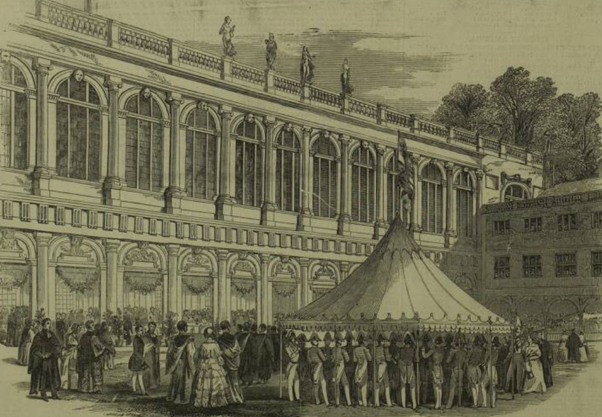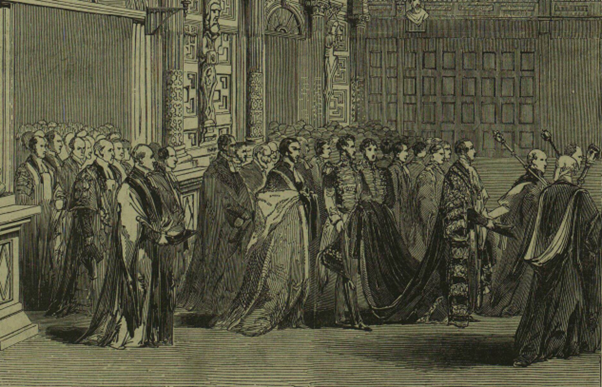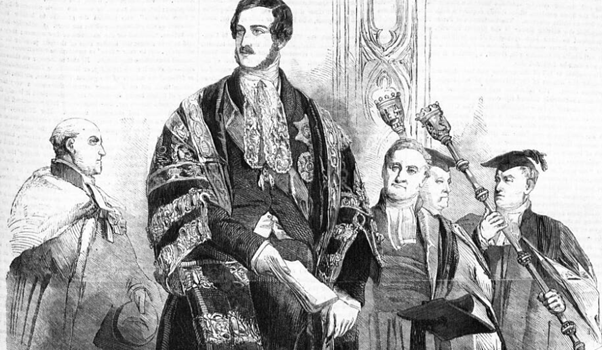Between 25th and 27th February 1847, the big contest for University Chancellor took place. It was Prince versus Powis. One, the husband to Queen Victoria (centre: SPOILER WARNING wearing the Chancellor’s robes), the other, (left of centre and – SPOILER WARNING – not wearing said Chancellor’s robes) was an Earl, an Anglican, and a Cambridge University man. The Chancellorship election of 1847 was intended to be a very simple affair. Following the death of the incumbent, the Duke of Northumberland in early 1847, a new Chancellor was required. Prince Albert was approached and expected to be given the role uncontested. So far, so good. However, this offer of appointment was not known to everyone. Other names began to emerge as prominent figures in from the colleges considered themselves fit for the role of Chancellor. Powis, a member of St John’s College, (colloquially known as the pigs) was one such candidate, and tossed his hat (cap) into the ring.
Selecting a Chancellor might not seem like a big deal, but, like most things, the episode was complicated by politics, both local and national. On the one hand, there was suspicion amongst Tories like Powis that Prince Albert preferred the opponents of the Tories, the Whig party. They would go on to win the General Election of that year and boot the Tory party (now emerging as the Conservative party) out of office. Powis, however, was a Tory. He had been an MP for Ludlow for 33 years. Complicating this matter further was the view that Cambridge, or more accurately, the University, was deemed to be unreformed. Great change had taken place in the country over the last 20 years, everything from Parliamentary reform in 1832, the abolition of slavery in 1834, and later in 1847, factory reform. Powis, however, had been part of the University, anti-reform, pro-Tory, and English (compared to the German Prince from the Saxon Duchy of Saxe-Coburg-Saalfeld), and so was a favourable choice, so much so that the election was a closer run affair than the Prince would have liked!
Despite the grimace on Powis’s face in the above engraving, no animosity seems to have existed towards either candidate. It just so happened that Powis had agreed to stand before he was aware that his opponent just so happened to be married to Queen Victoria. Having given his word to stand in the election, Powis honourably felt duty bound to continue in the contest.
Astoundingly, this harmonious genteel attitude failed to materialise in the press’s coverage of the election. Widely reported, neither Albert nor Powis came off well. The Pictorial Times commented on the state of unease that had come over the town in this showdown between Royalty and St John’s College, as the following song shows:
How is it, when so many men their loyalty evince
By asking for our chancellor the good and gracious Prince?
Is it some mighty strife between the Tories and the Whigs?
Oh no, it simply springs from this, “It doth not please the pigs”[1]
Other newspapers were just as unkind to Albert. A week after the election in which Albert won, the Morning Post declared it the ‘undignified contest’, with His Royal Highness winning a ‘miserable’ majority of 112’.[2] At a local level, the election was treated with more intrigue. Apprentice and resident in Cambridge, Josiah Chater, kept a record of the event in his diary. He monitored the votes across the three days and correctly predicted the Prince’s success:
‘Polling for the Chancellorship commenced at Ten O’clock this morning + terminated at 5 in the afternoon Earl Powis polled 571+ Prince Albert polled 578’.
With Albert’s candidacy victorious, it now fell to the University to extend the invitation for him to accept the role. You can imagine his hesitancy after the election had produced more attention than he would have liked! Ultimately, however, he accepted.
Between the 5th and 7th July, celebrations were carried out in Cambridge to commemorate the installation of the Prince as the University’s Chancellor. It was a unique moment in which Queen Victoria and the Prince visited Cambridge. They arrived at the recently built railway station to much fanfare. Shops closed early and crowds lined the streets of Cambridge. Young people like Josiah raced from building to building to get a view of the Royal couple (Josiah records 3 such glimpses of Queen Victoria in his diary). Over the three days, there were balloonists, fireworks, feasts, and concerts.

‘The Breakfast Beneath the Cloisters of Neville’s-Court’, Illustrated London News , 17 July 1847, 12
The ceremony took place at Senate House. Several special guests were in attendance to witness the occasion, including the Duke of Wellington and Sir Robert Peel, the recent Conservative Prime Minister who had encouraged Albert to take up the Chancellorship. The unease of the election had disappeared, and the ‘slumbering volcano of the finest passions’ remained dormant. Instead, a carnival atmosphere had taken its place.

‘The Prince Chancellor Accompanied by the Members of the University Entering the Hall of Trinity College’, Illustrated London News, 10 July 1847, 12.
If you find yourself walking around Cambridge near Trinity College, you are stepping on the same ground these great Victorians walked. The skyline would have included a great hot air balloon that had set off from nearby Parker’s Piece, whilst locals would have picnicked all around you on the greens and drunk ginger beer on the river. With last year’s coronation, it is a history that perhaps feels all the more familiar to us.
This blog was made possible through the Museum of Cambridge’s Research Volunteer team. Currently, we are working on our Victorian diary digitalisation project. If you would like to support this work and learn more about the heritage of Cambridge and its townsfolk, please consider donating to the Museum of Cambridge.
[1] Pictorial Times, 10 July 1847, 18.
[2] Morning Post, 1 March 1847, 5.

You made a few nice points there. I did a search on the subject matter and found nearly all people will agree with your blog.